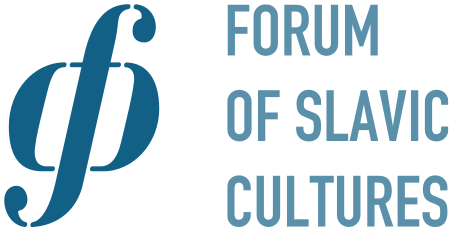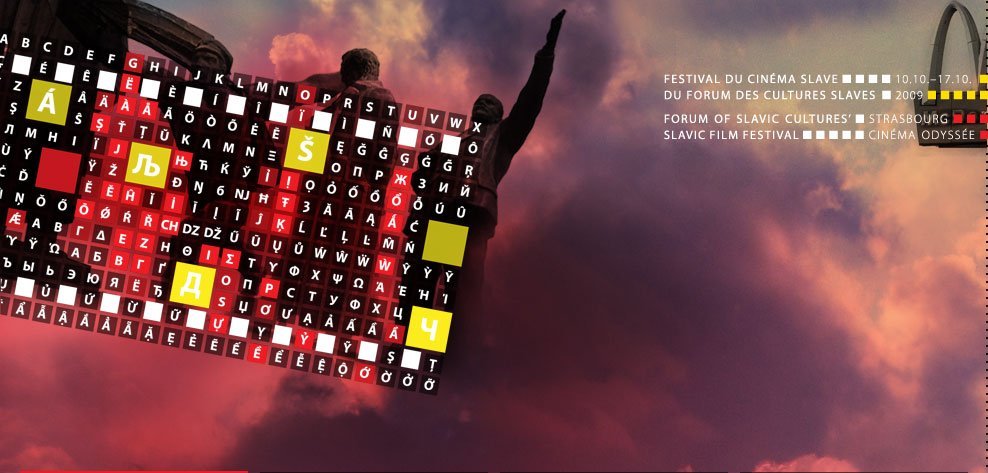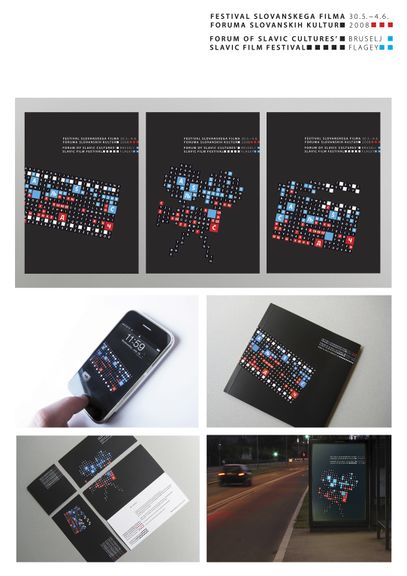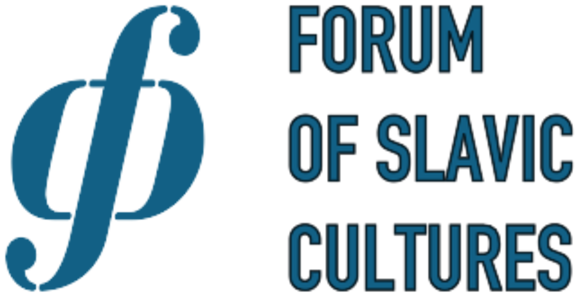Difference between revisions of "Forum of Slavic Cultures International Foundation"
(address) |
|||
| (41 intermediate revisions by 7 users not shown) | |||
| Line 1: | Line 1: | ||
{{Article | {{Article | ||
| − | | status = | + | | status = WRITING TOPROOFREAD NIFERTIK |
| − | | maintainer = | + | | maintainer = Editor |
}} | }} | ||
{{Infobox | {{Infobox | ||
| name = Forum of Slavic Cultures International Foundation | | name = Forum of Slavic Cultures International Foundation | ||
| local name = Mednarodna ustanova Forum slovanskih kultur | | local name = Mednarodna ustanova Forum slovanskih kultur | ||
| − | | | + | | logo = Forum of Slavic Cultures (logo).svg |
| − | | street = | + | | street = Cesta 27. aprila 47 |
| town = SI-1000 Ljubljana | | town = SI-1000 Ljubljana | ||
| − | | website = | + | | map = http://www.openstreetmap.org/?lon=14.50596&lat=46.04874&zoom=17&layer=mapnik |
| − | | email = | + | | website = https://www.fsk.si |
| − | | telephone = 386 (0) | + | | email = info@fsk.si |
| − | | fax = 386 (0) 1 | + | | telephone = 386 (0) 8 205 2800, 386 (0) 40 814 421 |
| − | + | | fax = 386 (0) 1 256 5738 | |
| − | |||
| − | |||
| managed by = Ministry of Culture | | managed by = Ministry of Culture | ||
| − | |||
| − | |||
| − | |||
| contacts = {{Contact | | contacts = {{Contact | ||
| − | | name = | + | | name = Andreja Rihter |
| role = Director | | role = Director | ||
| − | | | + | | email = andreja.rihter@fsk.si |
| − | + | }}{{Contact | |
| − | | | + | | name = Mateja Jančar |
| − | | | + | | role = Project manager |
| telephone = | | telephone = | ||
| − | + | | email = mateja.jancar@fsk.si | |
| − | |||
| − | |||
| − | |||
| − | |||
| − | | email = | ||
}} | }} | ||
| + | | accounts = | ||
| + | http://www.facebook.com/pages/Forum-slovanskih-kultur-Forum-of-Slavic-Cultures/259739220827373 | ||
| + | https://www.youtube.com/channel/UCf4TQZHxoz16vx_mYjK8M4Q | ||
| + | https://www.instagram.com/forumslovanskihkultur/ | ||
}} | }} | ||
| Line 40: | Line 34: | ||
The initiative to set up the [[Forum of Slavic Cultures International Foundation|Forum of Slavic Cultures]] was presented for the first time during the Bush-Putin Summit at Brdo pri Kranju in June 2001. The Forum of Slavic Cultures is an international institution established in [[established::2004]] as a legal entity of private law ("ustanova"). The organisation and operation of the Forum of Slavic Cultures falls under responsibility of the [[Ministry of Culture]]. | The initiative to set up the [[Forum of Slavic Cultures International Foundation|Forum of Slavic Cultures]] was presented for the first time during the Bush-Putin Summit at Brdo pri Kranju in June 2001. The Forum of Slavic Cultures is an international institution established in [[established::2004]] as a legal entity of private law ("ustanova"). The organisation and operation of the Forum of Slavic Cultures falls under responsibility of the [[Ministry of Culture]]. | ||
}} | }} | ||
| + | |||
| + | {{YouTube|qknohT8iX9A}} | ||
==Mission and membership== | ==Mission and membership== | ||
The Forum aims to preserve and develop cultural values, traditions and contents shared by Slavic-speaking countries. To this end it promotes co-operation among these countries in the cultural, educational and scientific spheres, develops cultural exchanges, organises meetings and provides for the design of joint projects. Achievements in these spheres are presented to the broad international public. The Slovene EU Presidency of 2008 provided a unique opportunity to present the Forum and the achievements of its members to a broad European public. | The Forum aims to preserve and develop cultural values, traditions and contents shared by Slavic-speaking countries. To this end it promotes co-operation among these countries in the cultural, educational and scientific spheres, develops cultural exchanges, organises meetings and provides for the design of joint projects. Achievements in these spheres are presented to the broad international public. The Slovene EU Presidency of 2008 provided a unique opportunity to present the Forum and the achievements of its members to a broad European public. | ||
| − | Members of the Forum include Belarus, Bosnia and Herzegovina, Bulgaria, Croatia, Macedonia, Montenegro, the Russian Federation, Serbia, Slovakia, Slovenia, and the Ukraine. | + | Members of the Forum include Belarus, Bosnia and Herzegovina, Bulgaria, the Czech Republic, Croatia, Macedonia, Montenegro, Poland, the Russian Federation, Serbia, Slovakia, Slovenia, and the Ukraine. |
In keeping with the standing statute of the Forum, each member country names one member of the Board as well as its own Programme Council (PC). The number of Council members is not limited, however, no more than three members per country can co-operate internationally or take part in international meetings. | In keeping with the standing statute of the Forum, each member country names one member of the Board as well as its own Programme Council (PC). The number of Council members is not limited, however, no more than three members per country can co-operate internationally or take part in international meetings. | ||
| − | == | + | ==Projects== |
The Forum of Slavic Cultures runs three major projects. The ''100 Slavic Novels'' collection is managed by the [[Slovene Writers’ Association]] and involves multilateral translations of 10 novels, selected by each member country. The first three Slovenian translations were: ''The Geographer Drank Away the Globe'' by Aleksej Ivanov, ''The First Second Coming'' by Aleksej Slapovski and a Macedonian novel ''Alphabet For the Disobedient'' by Venko Andonovski. | The Forum of Slavic Cultures runs three major projects. The ''100 Slavic Novels'' collection is managed by the [[Slovene Writers’ Association]] and involves multilateral translations of 10 novels, selected by each member country. The first three Slovenian translations were: ''The Geographer Drank Away the Globe'' by Aleksej Ivanov, ''The First Second Coming'' by Aleksej Slapovski and a Macedonian novel ''Alphabet For the Disobedient'' by Venko Andonovski. | ||
| − | The second major project is ''Slavic Heritage'' which fosters exhibition exchanges and the festivals dedicated to film (the Slavic Film Festival) and literature (the Slavic Bridge Festival and the [[Fabula Festival | + | The second major project is ''Slavic Heritage'' which fosters exhibition exchanges and the festivals dedicated to film (the Slavic Film Festival) and literature (the Slavic Bridge Festival and the [[World Literatures - Fabula Festival]]) while the third part of the programme is dedicated to ''Youth Exchange''. |
{{Wide image|Slavic_Film_Festival_2009_website.jpg}} | {{Wide image|Slavic_Film_Festival_2009_website.jpg}} | ||
| Line 58: | Line 54: | ||
In October 2009 the Forum supported participation of representatives of Bulgaria, Bosnia and Herzegovina, Serbia and Ukraine at the international symposium entitled ''1989-2009: Religion and the Turnaround in East Central and Southeast Europe'' organised by [[Slovenian Scientific Institute in Vienna]]. | In October 2009 the Forum supported participation of representatives of Bulgaria, Bosnia and Herzegovina, Serbia and Ukraine at the international symposium entitled ''1989-2009: Religion and the Turnaround in East Central and Southeast Europe'' organised by [[Slovenian Scientific Institute in Vienna]]. | ||
| + | |||
| + | |||
| + | In 2019 the project about the clothing culture identified the typical elements of the cultural heritage of Slavic nations in unique collections of the fashion designers of the younger and middle generations from Bulgaria, the Russian Federation, Slovakia, Slovenia (Jelena Proković) and Serbia. The exhibition took place at the beginning of the year 2020 at the Historical Atrium of the [[City Hall Atria]] in Ljubljana. | ||
| + | |||
| + | {{YouTube|oD-bKG7cMxU}} | ||
| + | |||
| + | == Živa Award for the best Slavic museum and heritage site == | ||
| + | |||
| + | Since 2014 the foundation and the European Museum Academy have bestowed the [[Živa Award]] for the Best Slavic Museum. Since 2018 the jury consisting of 13 museum experts from Slavic countries and the European Museum Academy also selects the winner of the Živa Award for the best Slavic heritage site. | ||
| + | More information you could find in the article about the [[Živa Award]]. | ||
==See also== | ==See also== | ||
| − | * [[ | + | * [[International Summer School of Museology]] |
| − | * [[ | + | * [[Živa Award]] |
| − | |||
==External links== | ==External links== | ||
| − | * [ | + | * [https://www.fsk.si Forum of Slavic Cultures International Foundation website] (in 12 Slav languages and English) |
{{Gallery}} | {{Gallery}} | ||
| Line 74: | Line 79: | ||
[[Category:Literature funding]] | [[Category:Literature funding]] | ||
[[Category:International funding]] | [[Category:International funding]] | ||
| + | [[Category:Literature support services]] | ||
| + | |||
| + | |||
| + | [[Category:EU funding of Slovene organisations (Culture and MEDIA Programmes)]] | ||
| + | [[Category:EU Creative Europe, Culture funding recipient]] | ||
| + | [[Category:Ukraine]] | ||
| + | [[Category:Funding,_professional_and_support_services]] | ||
| + | [[Category:Literature_funding,_professional_and_support_services]] | ||
Latest revision as of 22:18, 10 November 2023
-
to
5 Dec 2019
15 Dec 2019
Presentations by Forum of Slavic Cultures International Foundation and authors Anja Golob, Maja Haderlap, and Vlado Kreslin
at the Istria Festival of Books and Authors
-
to
14 Nov 2019
16 Nov 2019
Forum of Slavic Cultures International Foundation as a programme guest (among other, presenting 100 Slavic Novels collection, Živa Award, etc.),
at the International Cultural Forum
-
to
9 Apr 2019
15 Apr 2019
Women and the Great War : WWI through women's eyes exhibition created upon the initiative of the Forum of Slavic Cultures International Foundation) and the partner institutions from eight Slavic countries, in collaboration with the Permanent Delegation of the Republic of Slovenia to UNESCO and the Embassy of the Republic of Slovenia Paris,
-
14 Sep 2018
The presentation of the Slovenian Alpine Museum, winner of the 2017 Živa Award, and Nina Zdravič Polič (Slovene Ethnographic Museum) participating in the accompanying programme of the presentation of the Živa Award for the best Slavic museum, organised by the Forum of Slavic Cultures International Foundation in cooperation with the National Technical Museum of Prague,
-
to
5 Sep 2018
9 Sep 2018
Russia Moscow
Forum of Slavic Cultures International Foundation presents 100 Slavic Novels collection, with participation of writer Vlado Žabot, translator Žana Perkovska and Mateja Jančar (Forum of Slavic Cultures International Foundation),
at the Moscow International Book Fair
-
6 Aug 2018
Andreja Rihter (Forum of Slavic Cultures International Foundation) gives a lecture titled Why Slavic women writters matter at the conference of the ICOM International Committee for Literary and Composers’ Museums (ICLCM)
-
to
31 May 2018
3 Jun 2018
Russia Moscow Intermuseum VDNKH Pavilion No. 75
The Forum of Slavic Cultures International Foundation presents Slovenian museums Museum and Galleries of Ljubljana, Slovene Ethnographic Museum and Slovenian Alpine Museum, featuring lectures and panel discussions by Andreja Rihter (Forum of Slavic Cultures International Foundation), Blaž Peršin (Museum and Galleries of Ljubljana), Jernej Hudolin (Heritage preservation and restoration in Slovenia) and Martina Lesar Kikelj (Association of Slovene Restorers),
at the The International Festival Intermuseum
-
28 Nov 2017
Presentation of the project 100 Slavic Novels and the authors Suzana Tratnik and Marko Sosič by the Forum of Slavic Cultures International Foundation, supported by Slovenian Culture and Information Centre, Vienna (SKICA), Embassy of the Republic of Slovenia Vienna,
-
to
24 Aug 2016
28 Aug 2016
A presentation of Slovenian literature at the national stand, a lecture by Ifigenija Zagoričnik Simonović (Slovene Writers’ Association) and 100 Slavic Novels, a project by the Forum of Slavic Cultures International Foundation, organised by the Slovenian Book Agency in cooperation with the Embassy of the Republic of Slovenia Beijing
at the Beijing International Book Fair
-
to
13 Apr 2015
7 May 2015
A screening of Class Enemy, directed by Rok Biček (Triglav Film), and A Trip, directed by Nejc Gazvoda (Perfo Production), a literary-film evening with Nejc Gazvoda, lectures by Alenka Bartulovič (Faculty of Arts, University of Ljubljana), Đurđa Strsoglavec (Faculty of Arts, University of Ljubljana) and Urban Logar, and a presentation of the Forum of Slavic Cultures International Foundation at the W samo południe Festival, supported by the Embassy of the Republic of Slovenia Warsaw,
Mission and membership
The Forum aims to preserve and develop cultural values, traditions and contents shared by Slavic-speaking countries. To this end it promotes co-operation among these countries in the cultural, educational and scientific spheres, develops cultural exchanges, organises meetings and provides for the design of joint projects. Achievements in these spheres are presented to the broad international public. The Slovene EU Presidency of 2008 provided a unique opportunity to present the Forum and the achievements of its members to a broad European public.
Members of the Forum include Belarus, Bosnia and Herzegovina, Bulgaria, the Czech Republic, Croatia, Macedonia, Montenegro, Poland, the Russian Federation, Serbia, Slovakia, Slovenia, and the Ukraine.
In keeping with the standing statute of the Forum, each member country names one member of the Board as well as its own Programme Council (PC). The number of Council members is not limited, however, no more than three members per country can co-operate internationally or take part in international meetings.
Projects
The Forum of Slavic Cultures runs three major projects. The 100 Slavic Novels collection is managed by the Slovene Writers’ Association and involves multilateral translations of 10 novels, selected by each member country. The first three Slovenian translations were: The Geographer Drank Away the Globe by Aleksej Ivanov, The First Second Coming by Aleksej Slapovski and a Macedonian novel Alphabet For the Disobedient by Venko Andonovski.
The second major project is Slavic Heritage which fosters exhibition exchanges and the festivals dedicated to film (the Slavic Film Festival) and literature (the Slavic Bridge Festival and the World Literatures - Fabula Festival) while the third part of the programme is dedicated to Youth Exchange.
During 2009 the Forum of Slavic Cultures supported also some small-scale projects in Slovenia. The support was granted for the publishing of Studia Mythologica Slavica and a number of smaller international projects, e.g. a poetry translation workshop Golden Boat in Škocjan, Tomaj and Ljubljana, two international symposia in Ljubljana (Rearticulation – the Law of Capital: History of Oppression, Experimental Theatre Space in Central Europe), a touring of the performance Atelier by Bara Kolenc, etc.
In October 2009 the Forum supported participation of representatives of Bulgaria, Bosnia and Herzegovina, Serbia and Ukraine at the international symposium entitled 1989-2009: Religion and the Turnaround in East Central and Southeast Europe organised by Slovenian Scientific Institute in Vienna.
In 2019 the project about the clothing culture identified the typical elements of the cultural heritage of Slavic nations in unique collections of the fashion designers of the younger and middle generations from Bulgaria, the Russian Federation, Slovakia, Slovenia (Jelena Proković) and Serbia. The exhibition took place at the beginning of the year 2020 at the Historical Atrium of the City Hall Atria in Ljubljana.
Živa Award for the best Slavic museum and heritage site
Since 2014 the foundation and the European Museum Academy have bestowed the Živa Award for the Best Slavic Museum. Since 2018 the jury consisting of 13 museum experts from Slavic countries and the European Museum Academy also selects the winner of the Živa Award for the best Slavic heritage site. More information you could find in the article about the Živa Award.
See also
External links
- Forum of Slavic Cultures International Foundation website (in 12 Slav languages and English)






